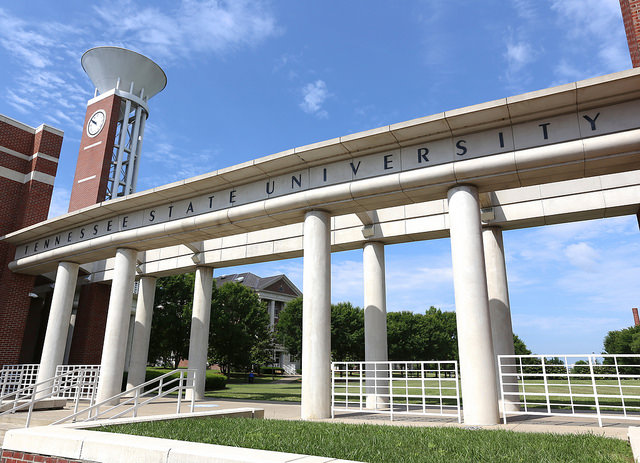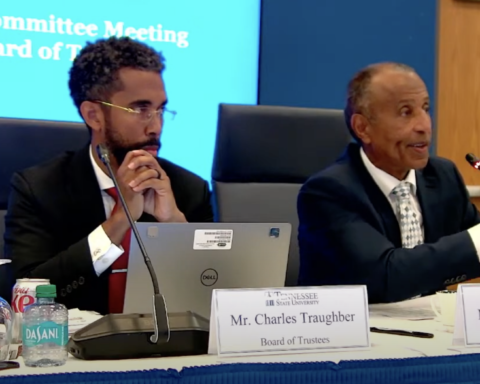By Bill Freeman
Where are our state and federal leaders when it comes to the challenges facing Tennessee State University, Nashville’s only public state-funded HBCU?
Gov. Bill Lee campaigned hard on his work with prison-outreach group Men of Valor, highlighting the stark contrast between the haves and the have-nots. He should be aware of the challenges facing Black students and how hard it is — regardless of the color of your skin — to get a college education when coming from a disadvantaged background. TSU and its student population are overcoming hurdles, but our leaders have yet to lift a finger to help.
Tennessee’s senior U.S. Sen. Marsha Blackburn has also been quiet on the subject — though she has in recent months made her opinion on a well-educated Black woman quite clear. The nation was taken aback by her mistreatment of Supreme Court Justice Ketanji Brown Jackson during Jackson’s confirmation hearing, asking if the judge had a “hidden agenda” and inspiring headlines such as Newsweek’s “Marsha Blackburn accused of racism over Ketanji Brown Jackson questions.” What a proud moment to be a Tennessean. While Blackburn has not made her opinion of TSU President Dr. Glenda Glover public, she may have similar unfounded suspicion of another Black woman in a position of leadership and responsibility.
It’s no secret that one of TSU’s greatest challenges has been the expense of providing a solid education. Nashville’s meteoric growth has been a challenge for many residents, and city growth has a large impact on an urban university with housing and educational responsibilities. When families find it difficult to find and keep homes in Nashville, the challenges facing an urban university are just as great. Combine that with the recent surge in TSU’s enrollment, and the school now has one of the best problems you can have: surging attendance, with more students than they’ve ever seen before. High praise for TSU, but it is indeed a logistical challenge.
TSU was recently in front of the state Senate’s Finance, Ways and Means Committee to discuss the framework for financial support for additional student housing. But as Tennessee Lookout’s Sam Stockard recently pointed out, the “outrage over TSU was outrageous.” Instead of discussing the logistics of a clearly needed student housing increase, this 10-member committee — notably composed of nine Republicans and a single Democrat — grilled TSU over years-old financial audit findings.
TSU has worked diligently to increase enrollment, and has achieved a dramatic increase of 2,000 more incoming freshmen this year. The treatment TSU received was out of line. The school deserves more respect and simply excels at recruiting new students. “TSU’s biggest sin,” writes Stockard, “appears to be a strong marketing program and an inability to say no.”
Some have pointed out that other schools — namely UT-Knoxville — would never have been treated this way. I have to agree. I love both schools and have supported them for many years, but the treatment Dr. Glover received from our state legislators was uncalled for. Dr. Glover is a rare find in the educational field. How rare? She has no peer in Tennessee’s other public universities. Out of every public university in the state of Tennessee, only two are led by a woman, and only two are led by a person of color. How many are led by a woman of color? One. Dr. Glover is the only Black woman to lead a public university in Tennessee. This is how we treat someone with a hard-earned and well-deserved position of authority? I agree with Stockard’s comment that UT-Knoxville President Randy Boyd would never have been treated this way — and I suspect that the other eight white men in charge of our public universities wouldn’t have been treated this way, either.
Increasing enrollment is the primary goal of our public educational institutions. Nearly a decade ago, former Gov. Bill Haslam’s “Drive to 55” program was implemented with the goal of having 55 percent of all Tennesseans earn a post-secondary degree or certificate by 2025. TSU has arguably done more than its fair share of the work to reach that high bar, which was set back in 2013. They were charged with increasing enrollment, and that’s exactly what they’ve done.
The bottom line is this: TSU’s housing needs are real. They deserve help from the state, they deserve better treatment from our state legislators, and they deserve better from our state government as a whole.





